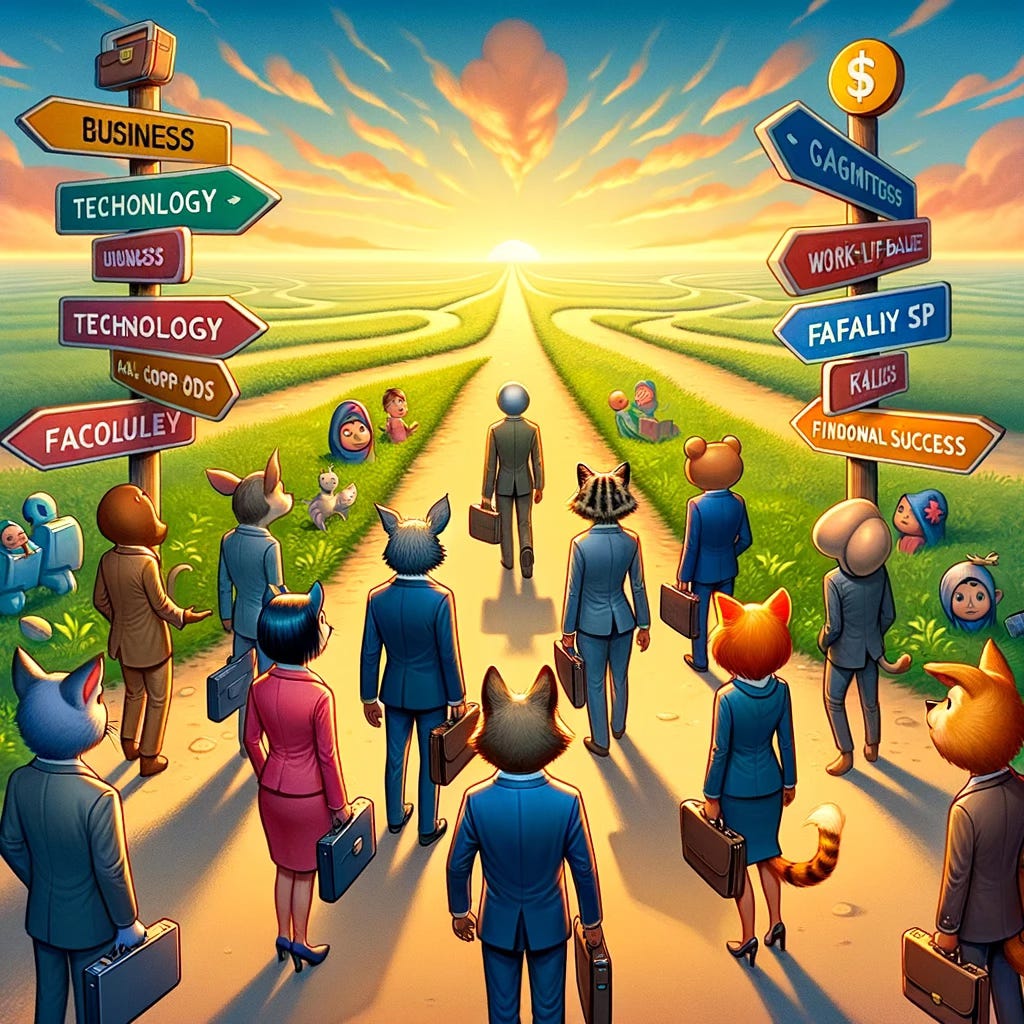In this edition
Stuff you might like
Making career decisions [reposted from LinkedIn]
Starting with values [reposted from LinkedIn]
Stuff you might like
Last week, I shared Noah Smith’s post arguing that humans might continue to have lots of high-paying jobs even with the rise of AI. This week I came across this piece by MIT’s David Autor, arguing that AI could help create well-paying middle class jobs. He argues that while the earlier wave of computerization had concentrated economic value in decision-making by elite professionals (lawyers, doctors, etc), AI tools can expand the pool of people capable of making those decisions and capturing that economic value. He also points out that AI could enable completely new types of jobs that are conceivable only because of AI (in the same way that electricians were inconceivable before electricity). The Bloomberg Odd Lots podcast did a great conversation with him.
Autor’s argument is different from Smith’s, but both make the point that a future of job destruction is not inevitable. As Autor said on the podcast:
“The future should not be treated as a forecasting or prediction exercise. It should be treated as a design problem because the future is not like the weather where we just wait and see what happens, right? We're making our own weather.”
I also liked Byrne Hobart’s piece on why investors pay 1000x more for a 10% return from a hedge fund than for a 10% return from an ETF. It basically comes down to volatility. If you had to sell your public equities in 2022 to free up some cash, you will have learnt how painful drawdowns can be. As Hobart writes:
“there's a very big difference between a return of 10% +/- 5% and 10% +/- 20%”
Making career decisions
[reposted from LinkedIn]
I am most commonly asked about career decisions, usually something like “I’m considering a new career direction” or “should I take this job”. I got these 3 times just last week.
I always respond with this question: “Where do you see yourself in 5 years?” 🌟
This question is open-ended. The timeframe just needs to be some distance into the future. And the answer can be as specific as “I want to be in ABC role at XYZ-type company” 🏢 or as general as “I want to still be learning, and to be fairly recognized for my work” 👩🎓 (essentially my own answer).
There is no right or wrong answer. It’s totally legitimate to say “I want to have the highest salary possible, in a role that allows me to prioritize my family” 👨👩👧👦; indeed, I would applaud that self-awareness! 👏
My mental model is that career decisions represent steps towards a destination 🛤️, and so you have to know what the destination is, before you can assess if something takes you closer to it.
It’s common to list and debate pros and cons; but without knowing where you want to go, how do you know what “better” means? 🤷♂️
(If all this sounds a little familiar … you might be thinking of my earlier post about asking “what are you prioritizing for” when making decisions. Much of my advising and coaching can be boiled down into 2 things: being intentional 🎯, and identifying the direction ➡️.)
But I usually go deeper, and ask: “why is that important to you?”
This question uncovers the underlying motivations, which are crucial to truly understand one's career aspirations. Peeling back the layers often reveals deeper insights and clarifies the ultimate objective 🔍.
For example, last week someone replied that they wanted to be in product management in 5 years. 10 minutes later, they realized that what they really wanted was to build something of their own, to prove that they could do it and to create a legacy to be proud of 🏗️.
Once we pinpoint the true destination, we can work on the steps to get there — which may or may not involve making the career change in the initial question.
Starting with values
[reposted from LinkedIn]
For years, I literally had Airbnb’s core values constantly open on my screen, albeit usually under all my other windows.
I didn’t consult them every day, but they were sometimes a powerful compass 🧭 for navigating certain difficult decisions.
This came to mind recently after discussions with two founders, who were separately facing ethical dilemmas.
Each of them had a proposed course of action in mind. One even anticipated my questions about the difficulties 🚩 resulting from their plan.
Instead, I asked both of them this same question: “What kind of values and culture do you want to build in your company?” 💬
I’ve learnt that questions touching on values and culture require answers that start with values and culture. There is no other way around it.
If you don’t explicitly start with the values and culture that you want, then you are implicitly choosing your values and culture — whether you like or even know it, and potentially paying a heavy price down the road.
I didn’t need to do much else beyond asking that question. One founder changed their decision to better align with their values ✅, and the other founder doubled down on their commitment to a difficult but necessary course of action 💪.
I am so proud of them for leading with integrity and picking the right path 🛤️, even if it is the harder path in the near term.



